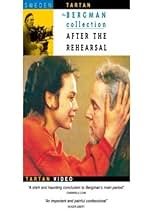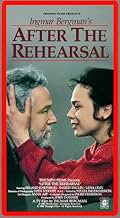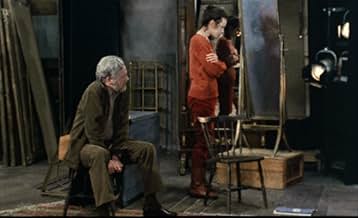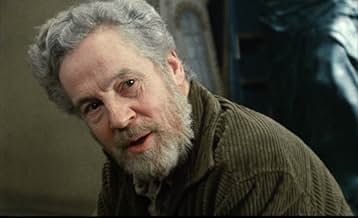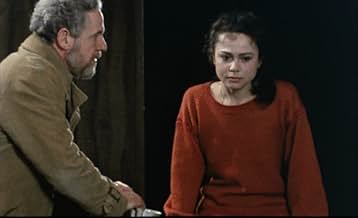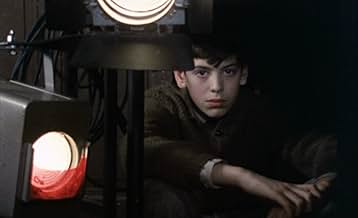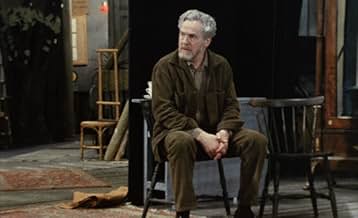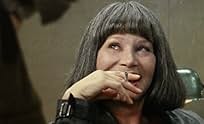CALIFICACIÓN DE IMDb
7.1/10
3.2 k
TU CALIFICACIÓN
Henrik, un director teatral, y Anna, la actriz principal de su última puesta en escena, hablan del pasado familiar y de sus hijos.Henrik, un director teatral, y Anna, la actriz principal de su última puesta en escena, hablan del pasado familiar y de sus hijos.Henrik, un director teatral, y Anna, la actriz principal de su última puesta en escena, hablan del pasado familiar y de sus hijos.
- Dirección
- Guionista
- Elenco
- Premios
- 2 nominaciones en total
- Dirección
- Guionista
- Todo el elenco y el equipo
- Producción, taquilla y más en IMDbPro
Opiniones destacadas
Essentially a playwright, adapted for the cinema, first as a screenwriter and then combining this role with that of director, Ingmar Bergman left an impressive cinematographic work but even more extensive in the theater, whether writing, adapting and directing other people's plays.
In the final phase of his career, he dedicated himself mainly to the theater and the few films he made, after the biopic that was Fanny & Alexander in 1982, were mere adaptations for the cinema or television of theater plays.
This is undoubtedly the case of this "After the Rehearsal" from 1984, which has only three characters and was filmed entirely on a stage, with a single set.
In retrospect, and considering everything that has been written and debated about Bergman since his death, particularly with regard to his relationship with the many actresses he worked with, one would say that this film is clearly autobiographical and reveals the author's sadness in dealing with old age, particularly with regard to his relationship with actresses, who continue to tempt him and seduce him, but to whom he no longer has anything to offer, other than his experience and his ability to make them blossom on stage or on screen.
A feeling shared by most men over fifty, especially those accustomed to a hectic love life, like Bergman, who was married five times and had nine children from five different women, including wives and more informal relationships.
The work is insightful and intelligent, as it could not be otherwise, with Bergman as the author, and the actors are the usual Erland Josephson and Ingrid Thulin, always magnificent, joined by a younger Lena Olin, who had already played supporting roles with Bergman since 1976, but makes her debut here, with a leading role, which would open doors for her future international career.
This is Bergman at his best, but in a static, theatrical, not very cinematic format. It is worth it for the script and performances, but as a film, it feels like too little. After all, is cinema just filmed theater, as Manoel de Oliveira believed?
In the final phase of his career, he dedicated himself mainly to the theater and the few films he made, after the biopic that was Fanny & Alexander in 1982, were mere adaptations for the cinema or television of theater plays.
This is undoubtedly the case of this "After the Rehearsal" from 1984, which has only three characters and was filmed entirely on a stage, with a single set.
In retrospect, and considering everything that has been written and debated about Bergman since his death, particularly with regard to his relationship with the many actresses he worked with, one would say that this film is clearly autobiographical and reveals the author's sadness in dealing with old age, particularly with regard to his relationship with actresses, who continue to tempt him and seduce him, but to whom he no longer has anything to offer, other than his experience and his ability to make them blossom on stage or on screen.
A feeling shared by most men over fifty, especially those accustomed to a hectic love life, like Bergman, who was married five times and had nine children from five different women, including wives and more informal relationships.
The work is insightful and intelligent, as it could not be otherwise, with Bergman as the author, and the actors are the usual Erland Josephson and Ingrid Thulin, always magnificent, joined by a younger Lena Olin, who had already played supporting roles with Bergman since 1976, but makes her debut here, with a leading role, which would open doors for her future international career.
This is Bergman at his best, but in a static, theatrical, not very cinematic format. It is worth it for the script and performances, but as a film, it feels like too little. After all, is cinema just filmed theater, as Manoel de Oliveira believed?
"After the Rehearsal was meant to be a pleasant little episode on my road toward death. ... (It) had a lot to do with my attitude and my relationship with the theater and the actors, with this dirty, dubious, fantastic, incredible, and cruel profession. That's all." -- Ingmar Bergman
Ingmar Bergman, age 66 and a couple years after his final feature film, Fanny and Alexander, was active in theater work and had a few TV movies left in him, of which this film is one. It takes place on a single set, a stage, has just three characters, and has the feeling of a simple play itself. It starts slowly but bear with it, it's only 73 minutes and finishes well.
Erland Josephson plays a theater director (without a doubt Bergman himself), who is musing in the empty theater after a rehearsal one day. His leading lady (Lena Olin) shows up on the pretext of looking for her bracelet; she's young enough to be his daughter, but has an interest in him. The two talk about their craft but also their personal lives, and as we come to understand that her mother worked with and loved him, she's conjured up in his imagination (Ingrid Thulin). It was a treat to see all three of these actors but maybe Thulin most of all, who at 58 has her character voice the sadness of aging, echoing the theater director in the present, even though she's still quite beautiful.
While it seemed a little bit vain of Bergman to have both the older and younger woman want him, er, the director sexually, the conversations build in momentum until with Olin he imagines the course their relationship would take if they gave in to their desire. It feels autobiographical and honest, helping to make up for a work that otherwise feels rather staid and erudite. While the film doesn't live up to its full potential, it's worth watching, especially if you're a Bergman fan.
Some quotes: "At my age, sometimes when you lean forward, your head suddenly finds itself in another reality. The dead are no longer dead. The living appear like ghosts. What was obvious a minute earlier becomes peculiar and hard to grasp."
"I'll tell you the pure and simple truth: I love actors. I love them as phenomena. I love their profession. I love their courage, or their contempt for death, whatever you want to call it. I understand their desire to escape, but also their dark, ruthless honesty."
"I hate turmoil, aggression, and outbursts of emotion. I administrate, distribute, and organize. I don't participate in the drama, I give it material form. I hate all things spontaneous, rash, and imprecise. I have no room for my own confusion except as a key to secrets of a script or as a stimulus for the creativity of actors."
"Nurture your childishness. It's a good filter against consciousness."
Ingmar Bergman, age 66 and a couple years after his final feature film, Fanny and Alexander, was active in theater work and had a few TV movies left in him, of which this film is one. It takes place on a single set, a stage, has just three characters, and has the feeling of a simple play itself. It starts slowly but bear with it, it's only 73 minutes and finishes well.
Erland Josephson plays a theater director (without a doubt Bergman himself), who is musing in the empty theater after a rehearsal one day. His leading lady (Lena Olin) shows up on the pretext of looking for her bracelet; she's young enough to be his daughter, but has an interest in him. The two talk about their craft but also their personal lives, and as we come to understand that her mother worked with and loved him, she's conjured up in his imagination (Ingrid Thulin). It was a treat to see all three of these actors but maybe Thulin most of all, who at 58 has her character voice the sadness of aging, echoing the theater director in the present, even though she's still quite beautiful.
While it seemed a little bit vain of Bergman to have both the older and younger woman want him, er, the director sexually, the conversations build in momentum until with Olin he imagines the course their relationship would take if they gave in to their desire. It feels autobiographical and honest, helping to make up for a work that otherwise feels rather staid and erudite. While the film doesn't live up to its full potential, it's worth watching, especially if you're a Bergman fan.
Some quotes: "At my age, sometimes when you lean forward, your head suddenly finds itself in another reality. The dead are no longer dead. The living appear like ghosts. What was obvious a minute earlier becomes peculiar and hard to grasp."
"I'll tell you the pure and simple truth: I love actors. I love them as phenomena. I love their profession. I love their courage, or their contempt for death, whatever you want to call it. I understand their desire to escape, but also their dark, ruthless honesty."
"I hate turmoil, aggression, and outbursts of emotion. I administrate, distribute, and organize. I don't participate in the drama, I give it material form. I hate all things spontaneous, rash, and imprecise. I have no room for my own confusion except as a key to secrets of a script or as a stimulus for the creativity of actors."
"Nurture your childishness. It's a good filter against consciousness."
Fanny and Alexander, to Ingmar Bergman, IS his last released film, written and directed by him. But this film, which was originally meant only for Swedish television, found its way to the USA and abroad, and (excluding Saraband, which was a film that just had to be made by its maker) is a welcome piece of theater, about the theater. After the Rehearsal is a short, but extremely satisfying take on what it means to be a director, and what it means to act, or to just be in the profession of the imitation of life. Bergman gives us only three actors (two kids, who pop up only for a few moments, one of which the child who wonderfully played Alexander in the above title, is one of them), and all that happens is talk, and talk.
To one who may not be familiar well with Bergman, it may not be wise to go immediately to this film. That is, unless one is very much in love with the theater. The filmmaker, who was also a major producer and director of countless theatrical production, is able to suffuse his personal views, good and bad, on the process, or the lack thereof. Interesting too is how his lead male, Henrik (Erland Josephsson, one of Bergman's most recognizable and accessible talents), has a conversation not just with an aspiring actress (Lena Olin), but also his ex-wife (Ingrid Thulin, also one of the magnificent women from Bergman's repertory company), to explore his past and present difficulties.
There is so much that Bergman brings to the table to discuss about the theater in this film, and in such a short running time, that it might be moot to delve very far into his what certain things may or may not 'mean'. Like many of the director's films, it's dramatic structure that tries to get behind the surfaces of what lies in seemingly one or two-sided characters. Henrik, at times, is given voice-over narration where he questions what he's saying, sometimes in anger or despair, to this young actress. Or, when his love (Thulin) is shown to be somewhat compassionate even as she seems a little crazed or, in fact, lonely. As Henrik and his pupil talk (not rehearse, of course) about why they are there, it becomes strikingly existential even when it's not meant to be. Olin is brilliant in the opposing side of Josephsson's often calm but boiling persona, as she tries to figure out what it is this director wants out of her.
When it comes down to it, Bergman is not only asking questions about the theater and the people in it, but also about human nature in its role of the theater. While this could sound like subject matter to scare or (worse) bore away some viewers, if you give the film enough patience for the 72 minutes (that seem to fill each minute with enough substance for an average work twice its length), it serves its purpose well enough to not be disregarded as an important later work in Bergman's career. And, by the way, if you're young (i.e. under 17) and have some reason to want to check this out, don't let the R rating deter you; it's one of the most un-necessarily R-rated films ever (for a brief flash of nudity, which could very well even be given a PG rating). A+
To one who may not be familiar well with Bergman, it may not be wise to go immediately to this film. That is, unless one is very much in love with the theater. The filmmaker, who was also a major producer and director of countless theatrical production, is able to suffuse his personal views, good and bad, on the process, or the lack thereof. Interesting too is how his lead male, Henrik (Erland Josephsson, one of Bergman's most recognizable and accessible talents), has a conversation not just with an aspiring actress (Lena Olin), but also his ex-wife (Ingrid Thulin, also one of the magnificent women from Bergman's repertory company), to explore his past and present difficulties.
There is so much that Bergman brings to the table to discuss about the theater in this film, and in such a short running time, that it might be moot to delve very far into his what certain things may or may not 'mean'. Like many of the director's films, it's dramatic structure that tries to get behind the surfaces of what lies in seemingly one or two-sided characters. Henrik, at times, is given voice-over narration where he questions what he's saying, sometimes in anger or despair, to this young actress. Or, when his love (Thulin) is shown to be somewhat compassionate even as she seems a little crazed or, in fact, lonely. As Henrik and his pupil talk (not rehearse, of course) about why they are there, it becomes strikingly existential even when it's not meant to be. Olin is brilliant in the opposing side of Josephsson's often calm but boiling persona, as she tries to figure out what it is this director wants out of her.
When it comes down to it, Bergman is not only asking questions about the theater and the people in it, but also about human nature in its role of the theater. While this could sound like subject matter to scare or (worse) bore away some viewers, if you give the film enough patience for the 72 minutes (that seem to fill each minute with enough substance for an average work twice its length), it serves its purpose well enough to not be disregarded as an important later work in Bergman's career. And, by the way, if you're young (i.e. under 17) and have some reason to want to check this out, don't let the R rating deter you; it's one of the most un-necessarily R-rated films ever (for a brief flash of nudity, which could very well even be given a PG rating). A+
This is a brilliant work of art - it manages to be both an outstanding piece of theatre captured on film and an equally engaging film about theatre. There is no plot in a conventional sense, and absolutely no action. Instead, Erland Josephson, utterly convincing in his role as an aging theatre director, quietly and with ruthless honesty interacts with both his current new star and an actress from his personal and professional past. During this interplay, the director on the screen (speaking for the director behind the camera?) explains his love for actors and the theatre, while simultaneously modeling and undermining the sense of alienation that he feels he needs to have in order to get his job done in this world that he loves. At the same time, his young star examines her reasons for acting, and the woman from his past presents yet another take on the function of theatricality.
The dialogue is, as always with Bergman, perfect; the film is saturated with ideas; and the simple stage where every moment of the film takes place works in two directions at once, reminding us that we are watching a performance even while it insists we are also seeing "real" people at work.
Bergman is always amazing in his ability to express, in films that are set in singular specific locations, deep emotions and concepts that are nonetheless universal - in this film he gives us a little bonus, an insight into the motives behind manufacture of representation itself.
The dialogue is, as always with Bergman, perfect; the film is saturated with ideas; and the simple stage where every moment of the film takes place works in two directions at once, reminding us that we are watching a performance even while it insists we are also seeing "real" people at work.
Bergman is always amazing in his ability to express, in films that are set in singular specific locations, deep emotions and concepts that are nonetheless universal - in this film he gives us a little bonus, an insight into the motives behind manufacture of representation itself.
This is only my second Ingmar Bergman viewing, the first being the magnificent "Seventh Seal", which left me with a long lasting impression. Perhaps it is not fair to compare this little ditty to the impressive, thoughtful epic that was the former film, but it was with such unrealistic expectations that I started watching "After the Rehearsal".
Unfortunately, I left the film disappointed and indifferent. The plot revolves around an aging play director's relation to his young lead actress, and concerns itself with acting, the personal relations of people in the profession, parenthood and estrangement. Alas, I'm afraid even my simplistic presentation makes the film sound far more interesting than it really is. In the end, "After the Rehearsal" only amounts to a monotonous (if articulate) study of romantic and interpersonal manipulation. I suppose viewers interested in acting and the theater might find something of interest in this movie, especially concerning the issues of what it means to act and direct, and how it affects persons of the field.
Personally, however, I was not engaged at all to the characters' petty personal issues, nor could I project parallels to issues larger than their own particular microcosm from their mundane -if eloquent- verbal sparring. If the "Sevent Seal"'s characters could be likened to those of Dostoyevsky's literature, "After the Rehearsal"'s protagonists would be more similar to Oscar Wilde's aestheticists and their monologues. Who do you prefer?
Unfortunately, I left the film disappointed and indifferent. The plot revolves around an aging play director's relation to his young lead actress, and concerns itself with acting, the personal relations of people in the profession, parenthood and estrangement. Alas, I'm afraid even my simplistic presentation makes the film sound far more interesting than it really is. In the end, "After the Rehearsal" only amounts to a monotonous (if articulate) study of romantic and interpersonal manipulation. I suppose viewers interested in acting and the theater might find something of interest in this movie, especially concerning the issues of what it means to act and direct, and how it affects persons of the field.
Personally, however, I was not engaged at all to the characters' petty personal issues, nor could I project parallels to issues larger than their own particular microcosm from their mundane -if eloquent- verbal sparring. If the "Sevent Seal"'s characters could be likened to those of Dostoyevsky's literature, "After the Rehearsal"'s protagonists would be more similar to Oscar Wilde's aestheticists and their monologues. Who do you prefer?
¿Sabías que…?
- TriviaIngmar Bergman was so impressed when he met Lena Olin for the first time that he wrote the part of Anna especially for her.
Selecciones populares
Inicia sesión para calificar y agrega a la lista de videos para obtener recomendaciones personalizadas
Detalles
Taquilla
- Total a nivel mundial
- USD 942
Contribuir a esta página
Sugiere una edición o agrega el contenido que falta

